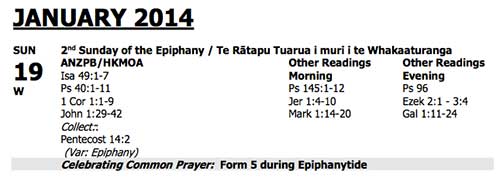A bill was passed at General Synod Te Hinota Whanui 2014 (GSTHW14) that we only refer to Sundays ‘of Advent, Christmas, Epiphany, and Easter’ and ‘in Lent and Ordinary Time’.
There was “detailed consideration” of the Bill at GSTHW14.
Having now passed this first hurdle, this Bill now goes for further careful debate and voting at each diocesan synod and hui amorangi, then back to another meeting of GSTHW, after which it lies on the table for anyone to challenge.
So, approximately three years from now we will no longer see things like this in our lectionary booklet:

Well we might… but we shouldn’t!
There will still, of course, be room for some variety in the Anglican Church of Or.
Some will count Sundays of Epiphany until February 2, and then randomly start counting from the 5th Sunday in Ordinary Time (leaving people to wonder what happened to the other 4!) I will count from the 1st Sunday in Ordinary Time. And then there will be a third group who will count Sundays of Epiphany all the way to Lent (meanwhile, magically having two “Fourth Sunday of Epiphany” and then skipping straight to “Sixth Sunday of Epiphany”:
But wait, there’s more! More confusion!
This Bill has to be read in conjunction with our formulary (agreed practice) “Liturgical Precedence 2009“. There we have agreed that “Ordinary time is the period after the Feast of the Presentation of Christ…” (February 2). The Western Church ordinarily starts counting Sundays in Ordinary Time from the Sunday after Epiphany (January 6). So NZ Anglicanism is starting counting Sundays in Ordinary Time 47 days later than the rest of the planet! Using the example of the 2015 calendar above, the rest of the Western Church will call Sunday February 8 the “5th Sunday in Ordinary Time”, but for NZ Anglicanism, following this Bill, Sunday February 8 would be the “1st Sunday in Ordinary Time”!!!
But wait. Believe it or not – there is even more! Because in the Anglican Church of Or “Liturgical Precedence 2009” has “The Presentation of Jesus in the Temple is celebrated either on 2 February or on the Sunday falling between 28 January and 3 February.” So in a year in which 2 February is a Saturday, some NZ Anglican communities might celebrate The Presentation on that Saturday, making the next day, 3 February, the 1st Sunday in Ordinary Time, and other communities might celebrate The Presentation on that Sunday (3 February), making 10 February the 1st Sunday in Ordinary Time. So 10 February for NZ Anglicans will be the 1st Sunday in Ordinary Time, or the 2nd Sunday in Ordinary Time (and subsequent Sundays will have two options), while, remember, most everyone else will be calling it the 5th Sunday in Ordinary Time.
The question to ask supporters of this Bill is how they will title Sundays in a revised Prayer Book.
An irony of the reporting of this Bill is that it is that it “would remove potential confusion“. But while it states that this Bill has been “confirmed and passed into law“, in fact, as I have described, it is only at the start of that lengthy process.
Shall we have a song competition for the synod meetings that will be debating this?
Here is the complete bill:
A Bill to Amend the Reference to Sunday Titles in all Formularies, Canons, and Publications of this Church
Whereas, various provisions exist for naming the Sundays in The Calendar – Te Maramataka, and these differ between the A New Zealand Prayer Book – He Karakia Mihinare o Aotearoa on pages 4-6 and pages 692-723, the Revised Common Lectionary, the Notes on the Calendar, and Celebrating Common Prayer, and
Whereas, consistency is desirable,
This General Synod/te Hīnota Whānui enacts as follows:
1. Title. The title of this Statute shall be The Reference to Sunday Titles in all Formularies, Canons, and Publications of this Church Statute 2014.
2. Purpose. To amend the Reference to Sunday Titles in all Formularies, Canons, and Publications of this Church.
3. The Sunday Titles should be described as being ‘of Advent, Christmas, Epiphany, and Easter’ and ‘in Lent and Ordinary Time’ in all references in Formularies/Canons/Publications of this Church, noting especially in A New Zealand Prayer Book – He Karakia Mihinare o Aotearoa pages 4-6, 525-536, and 550-602.
4. Clause 3 of this Statute is the adoption of a specific proposal in terms of Part B, Clause 6(a) of the Constitution/te Pouhere, and Section 4(a) of the Church of England Empowering Act 1928, and shall be made known to Te Runanganui o Te Pihopatanga o Aotearoa, the Synod of the Diocese of Polynesia, and the several Diocesan Synods in New Zealand.
One of the motivations of this Bill is laudable, “consistency is desirable”; do you think this Bill achieves that?
This is part of a series reflecting on General Synod Te Hinota Whanui 2014:
General Synod 2014
Blessing Committed Same-Sex Couples
Today is the Thirty-second Day of Easter.





“There was “detailed consideration” of the Bill at GSTHW14.”
My mind boggles. I should think like the average layperson in church this is akin to the number of angels on the head of a pin. Of course I come from the Sydney diocese where it has been reported that some graduates of the local theological college do not know what the word “Lent” means.
“I come from the Sydney diocese where it has been reported that some graduates of the local theological college do not know what the word “Lent” means.”
It’s the counterparty to “Borrowed”, surely?
I live in Sydney diocese, where nothing much surprises me.